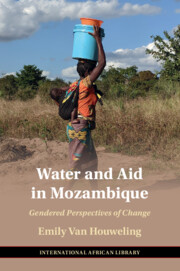Book contents
- Water and Aid in Mozambique
- The International African Library
- Water and Aid in Mozambique
- Copyright page
- Contents
- Figures
- Acknowledgements
- 1 Introduction
- 2 Divergent Development Discourses
- 3 Life before the Handpumps
- 4 Sustainability and Sense of Ownership
- 5 The Politics of Water Access
- 6 Gender Roles and Water Practices with the Handpumps
- 7 Development Encounters
- 8 Conclusions
- Glossary
- References
- Index
- Titles in the Series
6 - Gender Roles and Water Practices with the Handpumps
Published online by Cambridge University Press: 18 August 2022
- Water and Aid in Mozambique
- The International African Library
- Water and Aid in Mozambique
- Copyright page
- Contents
- Figures
- Acknowledgements
- 1 Introduction
- 2 Divergent Development Discourses
- 3 Life before the Handpumps
- 4 Sustainability and Sense of Ownership
- 5 The Politics of Water Access
- 6 Gender Roles and Water Practices with the Handpumps
- 7 Development Encounters
- 8 Conclusions
- Glossary
- References
- Index
- Titles in the Series
Summary
Chapter 6 focuses on the rural water project’s (RWP’s) gender approach and analyses how women experienced the project. In the RWP, gender was approached in a superficial and technical way that did not consider the matrilineal context of Nampula nor the constraints some women faced in participating. The outcomes of the water project for women were ambivalent and could not be easily interpreted within Western development frameworks. The project gave some women more free time and allowed them to fulfil the cultural expectations of a good wife, but it also increased some women’s workloads, reduced their control over water, and created new conflicts and tensions between people. My analysis of how women’s lives changed after the handpumps focuses on women’s intersectional identities and the spatial and temporal dynamics of the water spaces. Women strategically participated and used the handpumps in ways that aligned with their own value systems, while also pushing back against the aspects of the project that disrupted their lives and social relationships.
- Type
- Chapter
- Information
- Water and Aid in MozambiqueGendered Perspectives of Change, pp. 133 - 164Publisher: Cambridge University PressPrint publication year: 2022

